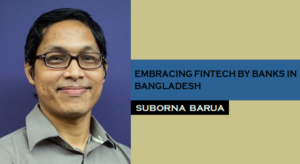- Suborna Barua
 Banks are at the heart of the development of Financial Technology (FinTech) environment. The rise of FinTech firms or start-ups has given a big shift to the financial services industry globally, in particular, in developed countries like the US, Australia, and the greater Europe. For example, Australia is now introducing Open Banking system from July 2019, to be implemented in three phases.The rapid growth of innovation-driven FinTech firms is complementing banks in developing and offering deeply focused financial solutions to customers. However, the realization of banks themselves perhaps has come a little late. Only recently some big banks like JP Morgan have started developing own in-house FinTech team. This beginning for sure is going to encourage many others and thus, reshape the banking industry globally forever.
Banks are at the heart of the development of Financial Technology (FinTech) environment. The rise of FinTech firms or start-ups has given a big shift to the financial services industry globally, in particular, in developed countries like the US, Australia, and the greater Europe. For example, Australia is now introducing Open Banking system from July 2019, to be implemented in three phases.The rapid growth of innovation-driven FinTech firms is complementing banks in developing and offering deeply focused financial solutions to customers. However, the realization of banks themselves perhaps has come a little late. Only recently some big banks like JP Morgan have started developing own in-house FinTech team. This beginning for sure is going to encourage many others and thus, reshape the banking industry globally forever.
Being a developing country, FinTech in Bangladesh is more known in the form of mobile-based financial services like bKash. While the enormity of bKash and other mobile-based financial services today says much about the promise of FinTech solutions in Bangladesh, our banking sector appear sluggish in embracing FinTech. A very important question arises amid the wider discussion of FinTech in Bangladesh: are our banks preparing themselves for the new wave? Do they have enough preparation to accommodate and exploit the enormous opportunity of FinTech? The answer, for now, seems to be negative to me.
Banks in Bangladesh still significantly lack technological blend in their products and services. There are several ways how FinTech can help our banks improvise their business models. Some of the promising areas could be the following:
- Algorithm-based credit evaluation: Using machine-learning and/or Artificial Intelligence for fast and accurate borrower credit quality evaluation. The manual process currently is tedious, lengthy, complex, and often carry significant human judgment and error propensity. Machines could do the job in no time with greater efficiency and accuracy.
- App-based centralized platform: Although some banks are currently facilitating online transactions, yet customers have to spend hours to make a simple withdrawal or deposit by physically visiting branches. Banks can introduce App-based transaction system where clients will be able to transfer, pay, receive, and manage their accounts/cards through a single Mobile/Electronic device application. While few banks have been working on it, the development remains substantially slow.
- Machine-driven customer service: Customer service quality and reputation for most banks in Bangladesh is less than par. Computer and algorithm based customer service system could improve service quality and efficiency and save cost for banks.
- Micro marketing using BIG data: Banks have transaction data of their clients, which could tell them about preferences and needs of their clients. As a result, such data could help develop customized offers and services for the clients instead of offer standardized products. Machine learning or AI is used to analyze such high-frequency data.
- FinTech startups collaboration: Banks could redesign their operation and services using FinTech solutions developed in-house. However, if banks want to have a quicker success with a relatively lower immediate cost, they could collaborate with local or international FinTech startups. The Third-party specialists would analyze client data and develop FinTech solutions that are to be offered by banks to their clients.
Research suggests that banks in Bangladesh invest significantly low amount in their building their IT capability and thus, are exposed to a greater threat to information security (Barua and Khan, 2009). Often banks perceive such investments as non-benefit generating expenses since they do not directly contribute to revenue. However, from a long-term view, there is no alternative of embracing technology in the financial products, services, and processes managed by banks. While the whole word, in particular, developed country financial institutions, realize how important it is to embrace FinTech, our banks seem reluctant, sluggish,and/or ignorant on this realization. Over the last decade, Bangladesh banking sector has expanded vastly in terms of width (e.g., no. of banks) but not in terms of depth (e.g., type of products), which is an unsustainable approach. FinTech is a must in today’s world to have a greater depth of financial services, and therefore, our banks must realize it and act today to save their own future.
Reference:
Khan, M.S. and S. Barua (2009). “The Status and Threats of Information Security in the Banking Sector of Bangladesh: Policies Required” Bangladesh Journal of Management and Information Systems, Vol. 1, No. 2, pp. 69-93.








